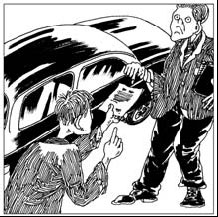The detention of a school headmaster after an incident with a top local official about two weeks ago in Suide County, Shaanxi Province, has sparked widespread public and media criticism across the country over the abuse of power by the local administrative authorities.
On December 25, Gao Yong, the headmaster of an occupational school, went to the office of the county mayor asking him to sign a paper approving funds to the school for zhuxuejin, or assistance for poor students.
The mayor turned down the request on the grounds that he needed to examine the paper before signing it, and told the teacher that he was leaving for an important meeting.
Thinking that officials in charge of education had signed the paper and that the mayor only needed to approve it, Gao insisted the mayor sign the paper right there and then.
He held open the door of the mayor's sedan and would not allow him to leave.
Later the head of the county's bureau of education suspended Gao from his post and forced him to apologize to the mayor. The chief of the police bureau ordered that Gao be detained.
After the event was revealed, media directed their criticism at the officials' abuse of administrative power. They rightfully pointed out that many local officials still regard themselves as lords, rather than servants of the public. This mindset of arrogance seems to exist among many officials and is easy to discern.
Nevertheless, another mentality which appears the opposite, but which is also common among these officials should not be overlooked. That is, the servility to the superior.

The punishment of Gao ordered by the chiefs of the education and police bureaus was undoubtedly unreasonable and illegal. They obviously did so to win favor of the mayor. All officials who bully their subordinates fawn on their superiors. If bullying the subordinate is the habitual behavior of a bureaucrat, toadying to the superior is the most despicable means of climbing up the official ladder. It helps corrupt the officialdom and in many cases develops into the direct trade of official posts for money.
In the Suide case, the mayor was reportedly unaware of the decisions of the two bureau chiefs in advance, though there is suspicion he had given instructions to them.
Even if they had got some hint from the mayor, they still would not be able to clear themselves of the infamy of toadying to the superior. And even if they had been explicitly instructed by the mayor to take moves, they are not qualified government workers, who should insist on behavior norms of public servants and reject incorrect orders from the superior.
Unconditionally following orders from leaders at higher levels is common among officials and there are too few people who dare to argue against their superior about right and wrong.
Gao, who is also a public servant as a school headmaster, is a rare one of great courage.
Gao's act of blocking the mayor's way may not be proper behavior, for the county head may have really needed some time to examine the paper. But his courage deserves our respect and his concern for the poor students is even more commendable.
His obstinacy is not without a reason. He wanted to get the assistance for the students before the end of the year and the money should have been allocated soon after the semester began in September.
Frankly speaking, if all officials are as brave as Gao in safeguarding the public's interests, the atmosphere of China's officialdom will be much more honest.
E-mail: liushinan@chinadaily.com.cn
(China Daily 01/09/2008 page8)